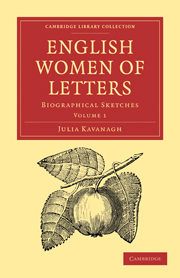Summary
More than a hundred and thirty years after the fame of Mademoiselle de Scudéry had reached its acmé, the name of Frances Burney redeemed English literature from the reproach of having produced no woman of genius sufficient to rule, for a time at least, the world of fiction. For some years Miss Burney was certainly the greatest of living English novelists. Her “Evelina” and “Cecilia” had, in their day, as much power and importance as the “Great Cyrus” and the “Princess of Clèves” in another. They were the books which everyone had read, or must read, of which the appearance created delighted surprise or impatient expectation. Goldsmith was dead, and Walter Scott was not yet in his teens. Miss Burney long stood first. Godwin never had her popularity—Mrs. Inchbald, though more original, and far more pathetic, failed in too many essentials to win an equal position—Mrs. Radcliffe appealed to a lower class of readers—moral teaching spoiled Miss Edgeworth as a novelist. Miss Austin was not popular in her lifetime. We find Sir Walter Scott talking of her to Miss Baillie, not long after her death, as the authoress “of some novels,” &c.—neither he nor anyone else could have spoken so of the authoress of “Cecilia” and “Evelina.” Her fame was rapid, solid, and widely-spread. It reached Germany and France, and may have extended farther.
- Type
- Chapter
- Information
- English Women of LettersBiographical Sketches, pp. 119 - 145Publisher: Cambridge University PressPrint publication year: 2010First published in: 1863

